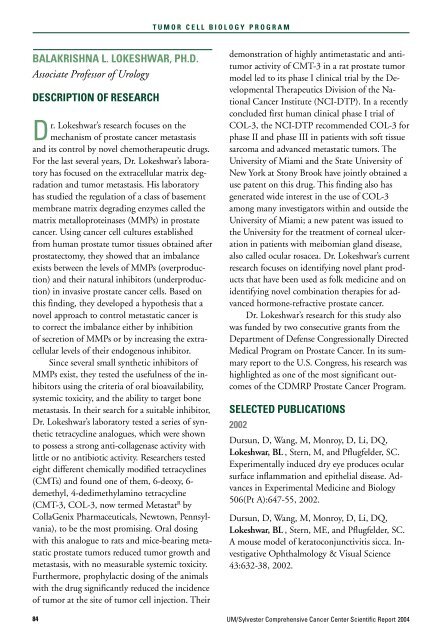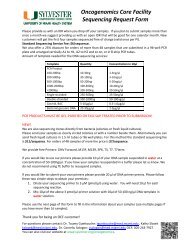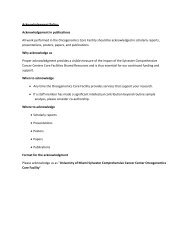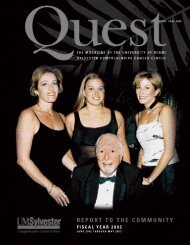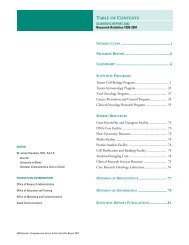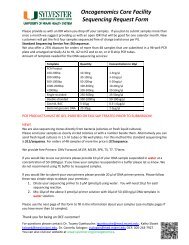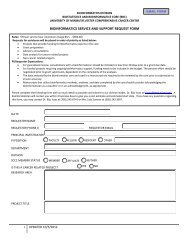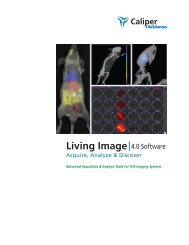SCIENTIFIC REPORT 2004 - Sylvester Comprehensive Cancer Center
SCIENTIFIC REPORT 2004 - Sylvester Comprehensive Cancer Center
SCIENTIFIC REPORT 2004 - Sylvester Comprehensive Cancer Center
You also want an ePaper? Increase the reach of your titles
YUMPU automatically turns print PDFs into web optimized ePapers that Google loves.
T U M O R C E L L B I O L O G Y P R O G R A M<br />
BALAKRISHNA L. LOKESHWAR, PH.D.<br />
Associate Professor of Urology<br />
DESCRIPTION OF RESEARCH<br />
Dr. Lokeshwar’s research focuses on the<br />
mechanism of prostate cancer metastasis<br />
and its control by novel chemotherapeutic drugs.<br />
For the last several years, Dr. Lokeshwar’s laboratory<br />
has focused on the extracellular matrix degradation<br />
and tumor metastasis. His laboratory<br />
has studied the regulation of a class of basement<br />
membrane matrix degrading enzymes called the<br />
matrix metalloproteinases (MMPs) in prostate<br />
cancer. Using cancer cell cultures established<br />
from human prostate tumor tissues obtained after<br />
prostatectomy, they showed that an imbalance<br />
exists between the levels of MMPs (overproduction)<br />
and their natural inhibitors (underproduction)<br />
in invasive prostate cancer cells. Based on<br />
this finding, they developed a hypothesis that a<br />
novel approach to control metastatic cancer is<br />
to correct the imbalance either by inhibition<br />
of secretion of MMPs or by increasing the extracellular<br />
levels of their endogenous inhibitor.<br />
Since several small synthetic inhibitors of<br />
MMPs exist, they tested the usefulness of the inhibitors<br />
using the criteria of oral bioavailability,<br />
systemic toxicity, and the ability to target bone<br />
metastasis. In their search for a suitable inhibitor,<br />
Dr. Lokeshwar’s laboratory tested a series of synthetic<br />
tetracycline analogues, which were shown<br />
to possess a strong anti-collagenase activity with<br />
little or no antibiotic activity. Researchers tested<br />
eight different chemically modified tetracyclines<br />
(CMTs) and found one of them, 6-deoxy, 6-<br />
demethyl, 4-dedimethylamino tetracycline<br />
(CMT-3, COL-3, now termed Metastat R by<br />
CollaGenix Pharmaceuticals, Newtown, Pennsylvania),<br />
to be the most promising. Oral dosing<br />
with this analogue to rats and mice-bearing metastatic<br />
prostate tumors reduced tumor growth and<br />
metastasis, with no measurable systemic toxicity.<br />
Furthermore, prophylactic dosing of the animals<br />
with the drug significantly reduced the incidence<br />
of tumor at the site of tumor cell injection. Their<br />
84<br />
demonstration of highly antimetastatic and antitumor<br />
activity of CMT-3 in a rat prostate tumor<br />
model led to its phase I clinical trial by the Developmental<br />
Therapeutics Division of the National<br />
<strong>Cancer</strong> Institute (NCI-DTP). In a recently<br />
concluded first human clinical phase I trial of<br />
COL-3, the NCI-DTP recommended COL-3 for<br />
phase II and phase III in patients with soft tissue<br />
sarcoma and advanced metastatic tumors. The<br />
University of Miami and the State University of<br />
New York at Stony Brook have jointly obtained a<br />
use patent on this drug. This finding also has<br />
generated wide interest in the use of COL-3<br />
among many investigators within and outside the<br />
University of Miami; a new patent was issued to<br />
the University for the treatment of corneal ulceration<br />
in patients with meibomian gland disease,<br />
also called ocular rosacea. Dr. Lokeshwar’s current<br />
research focuses on identifying novel plant products<br />
that have been used as folk medicine and on<br />
identifying novel combination therapies for advanced<br />
hormone-refractive prostate cancer.<br />
Dr. Lokeshwar’s research for this study also<br />
was funded by two consecutive grants from the<br />
Department of Defense Congressionally Directed<br />
Medical Program on Prostate <strong>Cancer</strong>. In its summary<br />
report to the U.S. Congress, his research was<br />
highlighted as one of the most significant outcomes<br />
of the CDMRP Prostate <strong>Cancer</strong> Program.<br />
SELECTED PUBLICATIONS<br />
2002<br />
Dursun, D, Wang, M, Monroy, D, Li, DQ,<br />
Lokeshwar, BL , Stern, M, and Pflugfelder, SC.<br />
Experimentally induced dry eye produces ocular<br />
surface inflammation and epithelial disease. Advances<br />
in Experimental Medicine and Biology<br />
506(Pt A):647-55, 2002.<br />
Dursun, D, Wang, M, Monroy, D, Li, DQ,<br />
Lokeshwar, BL , Stern, ME, and Pflugfelder, SC.<br />
A mouse model of keratoconjunctivitis sicca. Investigative<br />
Ophthalmology & Visual Science<br />
43:632-38, 2002.<br />
UM/<strong>Sylvester</strong> <strong>Comprehensive</strong> <strong>Cancer</strong> <strong>Center</strong> Scientific Report <strong>2004</strong>


